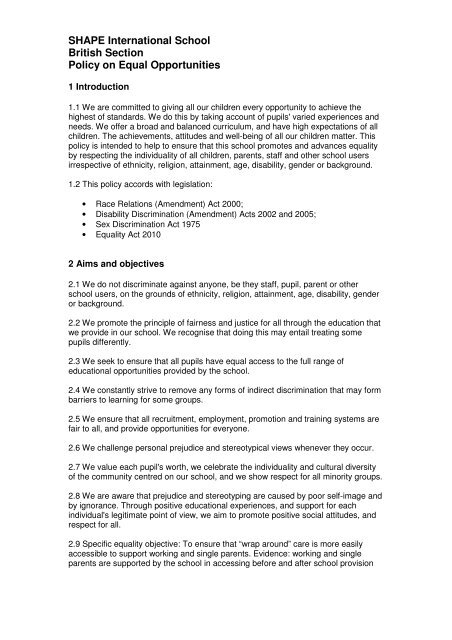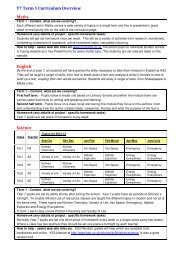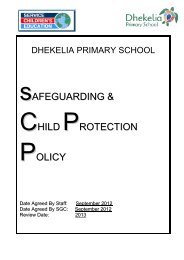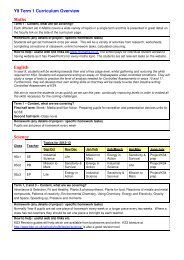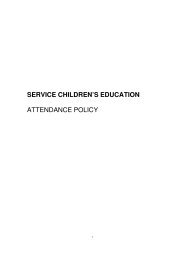Equal Opportunities Policy - Shape International School
Equal Opportunities Policy - Shape International School
Equal Opportunities Policy - Shape International School
Create successful ePaper yourself
Turn your PDF publications into a flip-book with our unique Google optimized e-Paper software.
SHAPE <strong>International</strong> <strong>School</strong>British Section<strong>Policy</strong> on <strong>Equal</strong> <strong>Opportunities</strong>1 Introduction1.1 We are committed to giving all our children every opportunity to achieve thehighest of standards. We do this by taking account of pupils' varied experiences andneeds. We offer a broad and balanced curriculum, and have high expectations of allchildren. The achievements, attitudes and well-being of all our children matter. Thispolicy is intended to help to ensure that this school promotes and advances equalityby respecting the individuality of all children, parents, staff and other school usersirrespective of ethnicity, religion, attainment, age, disability, gender or background.1.2 This policy accords with legislation:• Race Relations (Amendment) Act 2000;• Disability Discrimination (Amendment) Acts 2002 and 2005;• Sex Discrimination Act 1975• <strong>Equal</strong>ity Act 20102 Aims and objectives2.1 We do not discriminate against anyone, be they staff, pupil, parent or otherschool users, on the grounds of ethnicity, religion, attainment, age, disability, genderor background.2.2 We promote the principle of fairness and justice for all through the education thatwe provide in our school. We recognise that doing this may entail treating somepupils differently.2.3 We seek to ensure that all pupils have equal access to the full range ofeducational opportunities provided by the school.2.4 We constantly strive to remove any forms of indirect discrimination that may formbarriers to learning for some groups.2.5 We ensure that all recruitment, employment, promotion and training systems arefair to all, and provide opportunities for everyone.2.6 We challenge personal prejudice and stereotypical views whenever they occur.2.7 We value each pupil's worth, we celebrate the individuality and cultural diversityof the community centred on our school, and we show respect for all minority groups.2.8 We are aware that prejudice and stereotyping are caused by poor self-image andby ignorance. Through positive educational experiences, and support for eachindividual's legitimate point of view, we aim to promote positive social attitudes, andrespect for all.2.9 Specific equality objective: To ensure that “wrap around” care is more easilyaccessible to support working and single parents. Evidence: working and singleparents are supported by the school in accessing before and after school provision
3 Racial equality3.1 In our school, we will:• Strive to eliminate all forms of racism and racial discrimination;• Promote equality of opportunity;• Promote good relations between people of different racial and ethnic groups.3.2 It is the right of all pupils to receive the best education the school can provide,with access to all educational activities organised by the school. We do not tolerateany forms of racism or racist behaviour. Should a racist incident occur, we will dealwith it in accordance with school procedures (see policies for Racial <strong>Equal</strong>ity and forBehaviour and Discipline).3.3 We endeavour to make our school welcoming to all minority groups. We promotean understanding of diverse cultures through the topics studied by the children, andwe reflect this in the displays of work shown around the school.3.4 Our curriculum reflects the attitudes, values and respect that we have for minorityethnic groups. So, for example, in the curriculum topic on religious festivals, thechildren learn the importance of Diwali to Hindus and Sikhs.4 Disability non-discrimination.4.1 From time to time, some children in our school may have disabilities. We arecommitted to meeting the needs of these children, as we are to meeting the needs ofall within the school. The school fully meets the requirements of the amendedDisability Discrimination Act that came into effect in 2005. All reasonable steps will betaken to ensure that these children are not placed at a substantial disadvantagecompared with non-disabled children.4.2 The school is committed to providing an environment that allows disabledchildren full access to all areas of learning. Children with complex physical or mentaldisabilities may not be able to be accommodated within our school and in thesecases SCE and the Unit Welfare Officer will work with the parents to provide asuitable alternative placement. It is unlikely that an overseas posting will occur in thissituation.4.3 Teachers modify teaching and learning as appropriate for children withdisabilities. For example, they may give additional time to complete certain activities,or modify teaching materials, or offer alternative activities where children are unableto manipulate tools or equipment.5 Gender equality5.1 We recognise that nationally, the achievement of boys is falling behind that ofgirls. We are committed to seeing all individuals and groups of pupils making the bestprogress possible in our school.5.2 We have put in place a number of measures to raise the achievement of theboys. These include:• dealing with negative aspects of boys' behaviour, including bullying andname-calling;• removing gender bias from our resources;• making sure that our displays reflect boys and men as effective learners andachievers;
• encouraging boys to read fiction.5.3 To make our teaching more accessible to boys, we:• begin a lesson by stating the learning outcomes, and giving the 'big picture';• employ a variety of activities, and include a kinaesthetic element;• deliver work in bite-sized chunks, with 'brain breaks' and new starts;• provide challenge, competition and short-term goals;• give regular positive feedback and rewards;• set writing tasks that are cross-curricular, that have been modelled first, andfor which there are frames and scaffolds available.5.4 We realise that although gender is one of the key factors affecting educationalperformance, it affects different sub-groups of boys and girls in different ways. Socialclass, ethnic origin and local context are all strongly linked to performance. We alsoseek to ensure that policies designed to improve the boys' attainment do not do so atthe expense of achievement by the girls.6 The role of the Link Inspector Advisor6.1 The Link Inspector Advisor and Headmaster monitor and evaluate a range ofschool data. We check that all pupils are making the best possible progress, and thatno group of pupils is underachieving. To do this, we monitor:• admissions;• progress and attainment;• exclusions;• rewards and sanctions;• parents' and pupils' questionnaires.6.2 The Link Inspector Advisor and Headmaster seek to ensure that people withdisabilities are not discriminated against when applying for jobs at our school. Allreasonable steps are taken to ensure that the school environment properlyaccommodates people with disabilities where possible.6.3 SCE cannot meet the needs of complex physical and mental disabilities withintheir overseas schools. Parents who have a child with these disabilities shouldcontact their Unit Welfare Officer before accepting a new posting.6.4 SCE ensures that no child is discriminated against whilst in our school onaccount of their sex, religion or race. So, for example, all children have access to thefull range of the curriculum, and regulations regarding school uniform will be appliedequally to boys and girls. If a child's religion has a bearing on school uniform, thenthe school will deal with each case sensitively, and with respect for the child's culturaltraditions.7 The role of the headmaster7.1 It is the headmaster's role to implement the school's policy on equalopportunities, and he is supported by the school and SCE HQ staff in so doing.7.2 It is the headmaster's role to make sure that all staff are aware of the schoolpolicy on equal opportunities, and that staff apply these guidelines fairly in allsituations.
7.3 The headmaster ensures that all appointments panels give due regard to thispolicy, so that no one is discriminated against.7.4 The headmaster promotes the principle of equal opportunity when developing thecurriculum, and in providing opportunities for training.7.5 The headmaster promotes respect for other people in all aspects of school life; inthe assembly, for example, respect for other people is a regular theme, as it is also indisplays around the school.7.6 The headmaster views all incidents of unfair treatment, and any racist incidents,with due concern.8 The role of all staff members8.1 Staff do their best to ensure that all pupils are treated fairly and with respect. Wedo not knowingly discriminate against any child.8.2 When selecting classroom material, staff strive to provide resources which givepositive images, and which challenge stereotypical images of minority groups.8.3 We seek to implement this policy when designing schemes of work, both in ourchoice of topics to study, and in how we approach sensitive issues. So, for example,history topics include examples of the significant contributions women have made inthis country's history. In geography, the teacher attempts to counter stereotypicalimages of Africa and Asia, and to show the true diversity of development in differentparts of the world.8.4 All staff challenge any incidents of prejudice or racism. We record any incidentson a Cause for Concern form and draw them to the immediate attention of theheadmaster.9 Monitoring and review of <strong>Policy</strong> and <strong>Equal</strong>ity Impact Assessments9.1 It is the responsibility of the Link Inspector Advisor and Headmaster to monitorthe effectiveness of this policy. This will include the following <strong>Equal</strong>ity ImpactAssessments:a) monitor the progress of pupils from minority groups, comparing it with theprogress made by other pupils in the school;b) monitor the staff appointment process, so that no one applying for a post atthis school is discriminated against;c) take into serious consideration any complaints from parents/carers, staff orpupils regarding equal opportunity;d) monitor the school's behaviour records, and the numbers of exclusions, tomake sure that pupils from minority groups are not unfairly treated.The Headmaster will report to the SGC annually on the work conducted by himselfand the Link Inspector Advisor on evaluating the effectiveness of this policy and the<strong>Equal</strong>ity Impact assessments.<strong>Policy</strong> and <strong>Equal</strong>ity Impact Assessments reviewed by SGC: February 2013


